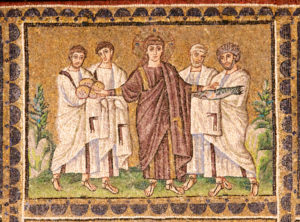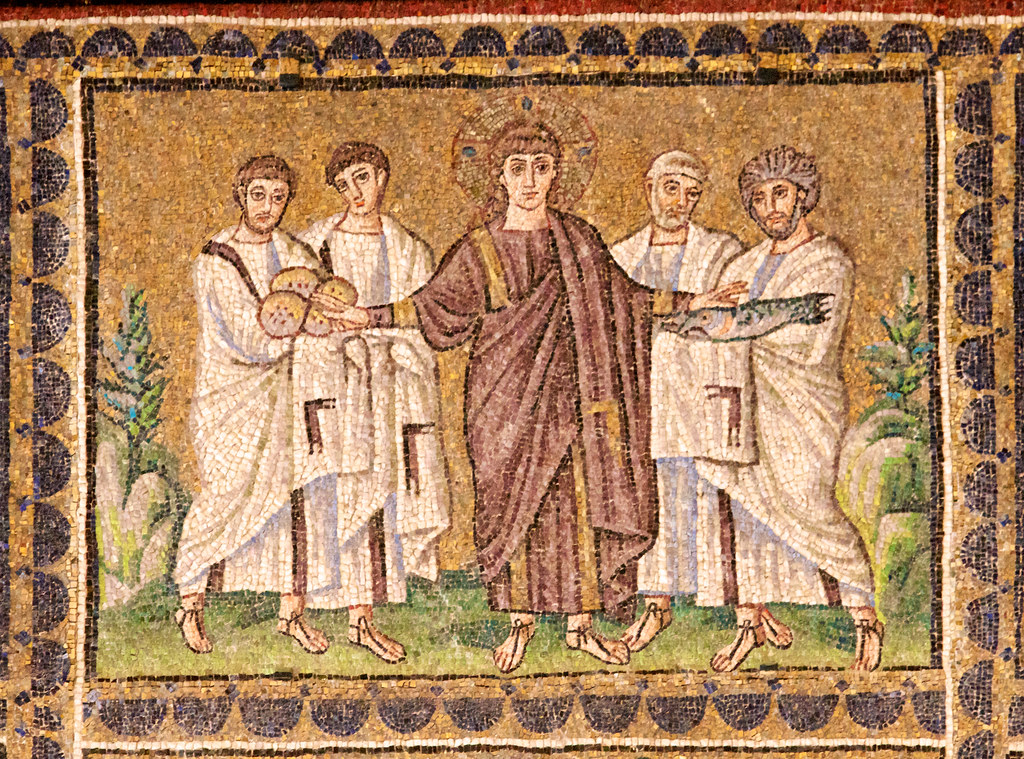 Written as an aid for homilists and a resource for the faithful, this doctrinal homily outline (1) provides insights into the Lectionary readings, (2) explicates a doctrine of Catholic Faith or morals from them, and (3) shows specific ways lay persons can live these truths. (To read more about this approach, click here.)
Written as an aid for homilists and a resource for the faithful, this doctrinal homily outline (1) provides insights into the Lectionary readings, (2) explicates a doctrine of Catholic Faith or morals from them, and (3) shows specific ways lay persons can live these truths. (To read more about this approach, click here.)
Central idea and doctrine: Christ’s miracles announce the Kingdom of God. Practical application: The spiritual works of mercy.
Lectionary 112.
Central idea: The Miracles of Christ announce the Kingdom of God
Reading 1 Is 55:1-3
Thus says the LORD:
All you who are thirsty,
come to the water!
You who have no money,
come, receive grain and eat;
Come, without paying and without cost,
drink wine and milk!
Why spend your money for what is not bread;
your wages for what fails to satisfy?
Heed me, and you shall eat well,
you shall delight in rich fare.
Come to me heedfully,
listen, that you may have life.
I will renew with you the everlasting covenant,
the benefits assured to David.
- Many times in Jewish history, especially in the time of distress in which Isaiah wrote, the Chosen people were overwhelmed, unsure if they would even survive.
- We also, because of the constant drag of original sin, can often feel empty inside and worry that we will never have the good things we desire, never really have life.
- God promises to satisfy our hunger and thirst for physical and spiritual goods. We want to have life and that is what he promises: “I came that they may have life, and have it abundantly” (Jn 10:10). These goods are a gift.
Responsorial Psalm Ps 145:8-9, 15-16, 17-18
R. The hand of the Lord feeds us; he answers all our needs.
The LORD is gracious and merciful,
slow to anger and of great kindness.
The LORD is good to all
and compassionate toward all his works.The eyes of all look hopefully to you,
and you give them their food in due season;
you open your hand
and satisfy the desire of every living thing.The LORD is just in all his ways
and holy in all his works.
The LORD is near to all who call upon him,
to all who call upon him in truth.
- We have no need of other persons and we have no need of God: These are fictions that can seem believable. Some think it is degrading to consider oneself like a hungry child or a beggar whose eyes are on another to see if he will be given something.
- It is a fiction that we are not in need, and it is not degrading to be needy. We really are interdependent when it comes to the natural world and other human beings. And we really are dependent when it comes to God. He created our bodies through our parents and created our souls directly at the moment of conception. He sustains us and everything else in being in every moment.
- It is good that God is just and kind so that we can call upon him with confidence.
Reading 2 Rom 8:35, 37-39
Brothers and sisters:
What will separate us from the love of Christ?
Will anguish, or distress, or persecution, or famine,
or nakedness, or peril, or the sword?
No, in all these things we conquer overwhelmingly
through him who loved us.
For I am convinced that neither death, nor life,
nor angels, nor principalities,
nor present things, nor future things,
nor powers, nor height, nor depth,
nor any other creature will be able to separate us
from the love of God in Christ Jesus our Lord.
- We have just been promised that our physical needs for good food and drink will be met, but that is not good enough if we are constantly insecure, if everything can be taken away from us at any time, which is our condition in this life.
- St. Paul claims that nothing can ultimately harm us. But what is more, this protection is founded in the greatest good: We will be joined to God in Christ in love.
Gospel Mt 14:13-21
When Jesus heard of the death of John the Baptist,
he withdrew in a boat to a deserted place by himself.
The crowds heard of this and followed him on foot from their towns.
When he disembarked and saw the vast crowd,
his heart was moved with pity for them, and he cured their sick.
When it was evening, the disciples approached him and said,
“This is a deserted place and it is already late;
dismiss the crowds so that they can go to the villages
and buy food for themselves.”
Jesus said to them, “There is no need for them to go away;
give them some food yourselves.”
But they said to him,
“Five loaves and two fish are all we have here.”
Then he said, “Bring them here to me, ”
and he ordered the crowds to sit down on the grass.
Taking the five loaves and the two fish, and looking up to heaven,
he said the blessing, broke the loaves,
and gave them to the disciples,
who in turn gave them to the crowds.
They all ate and were satisfied,
and they picked up the fragments left over—
twelve wicker baskets full.
Those who ate were about five thousand men,
not counting women and children.
- By the sign Jesus performed he showed that in the Messianic kingdom people would have their physical needs fulfilled. They ate and were satisfied for free. This showed Isaiah’s prophecy was coming true.
- In the time leading up to this miracle, Our Lord might have felt sad and needing to be alone with the Father, just having been told of the death of his cousin and friend and fellow worker John the Baptist. Whatever things he felt, he did not permit these to stop him from having compassion on the crowd, curing their sick, and then feeding them with an abundance of loaves and fish.
Doctrine: The Miracles of Christ
- Christ’s miracles are signs of the Kingdom of God, the way things will be when Christ reigns in our hearts and when he fully reigns in the world.
- In the Gospel passage we just heard, Jesus cured the sick the crowds had brought him and then fed them all through the miracle of the loaves and fish.
- Jesus’ preaching is accompanied by “mighty works and wonders and signs” which “manifest that the kingdom is present in him and attest that he was the promised Messiah” (CCC 547). They “strengthen faith . . . [and] bear witness that he is the Son of God” (CCC 548).
- In other words, Christ’s miracles witness the truth of his words.
- Some people have thought to ask, why did not Christ perform a universal miracle and heal and feed and give eternal life to everyone then living and everyone who would ever live? Some people assert that if Christ was all-wise, all-good, and all-powerful he would have to do just that.
- This is the answer the Catechism gives. “By freeing some individuals from the earthly evils of hunger, injustice, illness, and death, Jesus performed messianic signs. Nevertheless he did not come to abolish all evils here below, but to free men from the gravest slavery, sin, which thwarts them in their vocation as God’s sons and causes all forms of human bondage. (CCC 549)
- It was, then, not Christ’s intention to end every evil.
- It was not even Christ’s intention to abolish sin, but to free men from its slavery.
- Does sin really thwart one’s vocation as a child of God? Yes. It is the only thing that can separate us from the love of Christ.
- Is sin really the cause of every form of human bondage? Yes.
Practical application: The spiritual works of mercy
- There are many “signs” that we children of God are supposed to perform with the help of the graces God blesses us with. One group of these are the spiritual works of mercy. As Fr. John Hardon points out, these are the “traditional seven forms of Christian charity in favor of the soul or spirit of one’s neighbor, in contrast with the corporal works of mercy that minister to people’s bodily needs.”
- The seven are converting the sinner, instructing the ignorant, counseling the doubtful, comforting the sorrowful, bearing wrongs patiently, forgiving injuries, and praying for the living and the dead.
- The needs of the body are important but objectively those of the soul are even more, because, as we have seen, sin is the gravest slavery.
- It is good to think about your current situation, the people around you and their needs. That will reveal the opportunities you have to perform these works of mercy. There certainly are such opportunities in every person’s life.

Leave a Reply